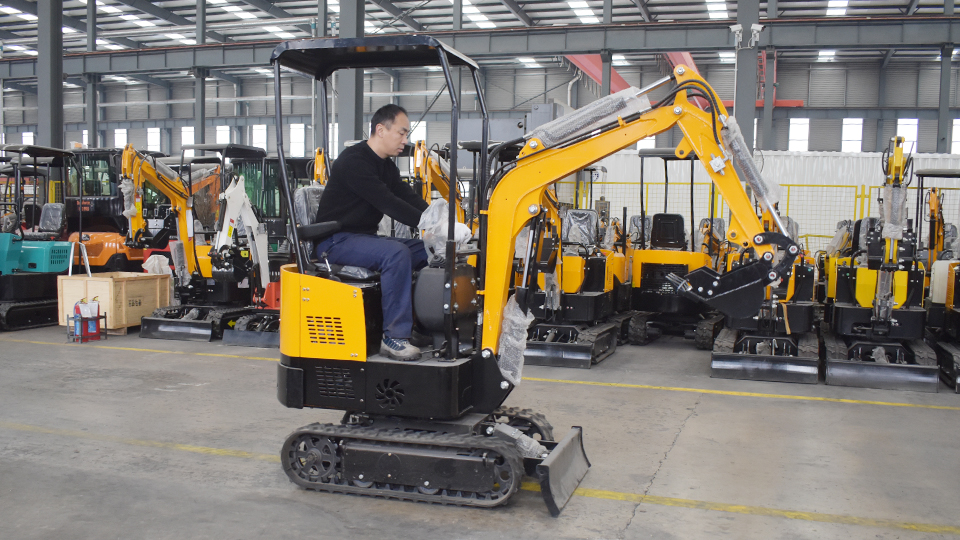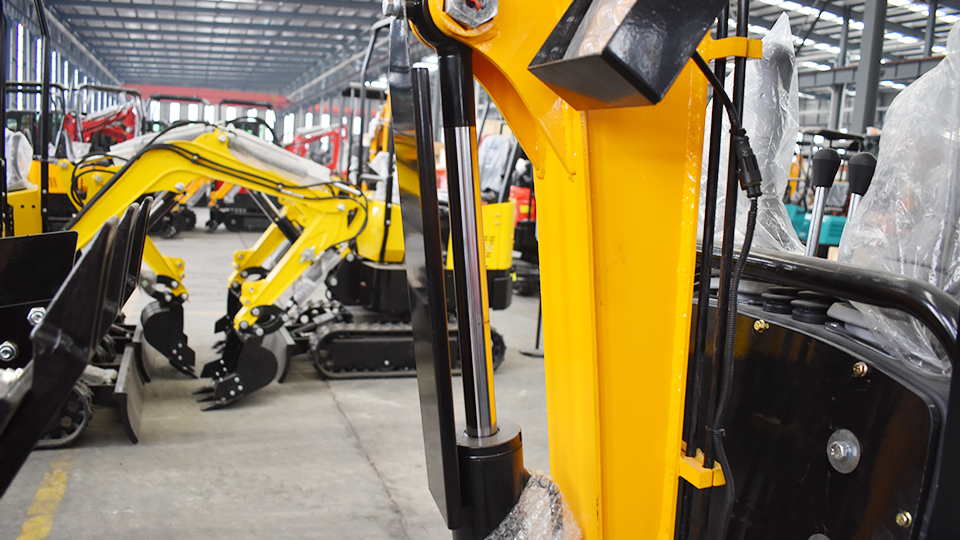Mini excavators have become the go-to solution for a vast array of digging and earthmoving tasks in confined spaces or on projects that don't necessitate the sheer power of a full-sized excavator. Their compact footprint, versatility with various attachments, and ease of transport make them ideal for landscaping, utility work, trenching, demolition, and even some indoor applications. However, purchasing a mini excavator can be a significant capital investment, especially for infrequent users or those with variable project needs. This is where the rental market plays a crucial role, offering access to these powerful machines on a temporary basis.
This technical article will serve as a comprehensive guide to navigating the mini excavator rental landscape. We will explore the various avenues available for renting these versatile machines, discuss key considerations for choosing the right rental provider and equipment, and provide insights into the rental process to ensure a smooth and efficient experience. Whether you're a homeowner tackling a weekend project or a contractor needing extra equipment for a specific job, understanding where and how to rent a mini excavator is essential.
Understanding Your Needs Before You Rent:
Before embarking on your rental journey, it's crucial to define your specific requirements. This will help you narrow down your options and ensure you rent the right machine for the job. Consider the following:
Project Scope and Duration: How long will you need the mini excavator? Rental periods can range from a few hours to weeks or even months, with pricing structures often varying based on duration (daily, weekly, monthly rates).
Digging Depth and Reach Requirements: What is the maximum depth you need to dig? What is the required horizontal reach for your tasks? Different mini excavator models offer varying digging depths and reach capabilities.

Space Constraints: How much room do you have to maneuver the excavator? Consider the width and tail swing of the machine, especially if working in confined areas. Zero-tail-swing (ZTS) models are ideal for tight spaces.
Lifting Capacity: Will you need to lift and move heavy objects? Check the lifting capacity of the mini excavator at different reaches.
Attachment Requirements: Will you need any specific attachments, such as different-sized buckets, breakers, augers, or grapples? Ensure the rental provider offers the necessary attachments and that the machine is compatible.
Ground Conditions: What type of terrain will you be operating on? Consider the need for rubber or steel tracks based on the ground surface and potential for damage.
Transportation: How will you transport the mini excavator to and from your job site? Factor in the weight and dimensions of the machine and whether you need to rent a trailer as well.
Budget: Determine your rental budget, including the cost of the machine, attachments, transportation, and any potential insurance or environmental fees.
Where to Rent Mini Excavators: Diverse Avenues:
Once you have a clear understanding of your needs, you can explore the various places that offer mini excavator rentals:
National Equipment Rental Companies: These are large, well-established companies with numerous locations across the country. They typically offer a wide range of equipment, including various sizes of mini excavators from different manufacturers.
Pros: Extensive inventory, often newer models, established processes, online booking platforms, delivery and pickup services, nationwide presence.
Cons: Can sometimes be pricier than local options, may have less personalized service.
Examples: United Rentals, Sunbelt Rentals, Herc Rentals, EquipmentShare, BigRentz.
Local Independent Equipment Rental Companies: These are smaller, locally owned businesses that focus on serving their specific geographic area.
Pros: Potentially more competitive pricing, personalized service, local expertise, flexibility in rental terms.
Cons: Inventory may be more limited, may not always have the newest models, online booking might not be as sophisticated.
How to Find: Search online for "equipment rental near me," "construction equipment rental [your city]," or "mini excavator rental [your zip code]." Look for local businesses with good reviews.
Home Improvement Retailers: Some major home improvement chains offer tool and equipment rentals, including smaller mini excavators suitable for homeowner projects.
Pros: Convenient for smaller, short-term projects, often have basic models available.
Cons: Limited selection of sizes and features, may not offer attachments beyond standard buckets, potentially higher daily rates for longer durations.
Examples: The Home Depot Rental, Lowe's Tool Rental.
Online Equipment Rental Marketplaces: These platforms act as aggregators, connecting renters with various rental companies (both national and local) in their area.
Pros: Ability to compare prices and availability from multiple suppliers in one place, convenient online booking.
Cons: May not have direct contact with the equipment owner until booking, potential for varying service levels depending on the underlying rental company.
Examples: DOZR, EquipmentShare (also operates its own rental fleet).

Specialty Excavator Rental Companies: In some areas, there might be companies that specialize specifically in excavator rentals, potentially offering a wider selection and more expertise in this specific equipment type.
Pros: Deep knowledge of excavators, potentially a wider range of models and attachments, specialized service.
Cons: May not be available in all areas.
How to Find: Search online for "excavator rental [your city]" or "mini excavator specialist."
Key Considerations When Choosing a Rental Provider:
Once you've identified potential rental sources, consider the following factors to make the best choice:
Price and Payment Terms: Compare rental rates (daily, weekly, monthly), any additional fees (delivery, pickup, insurance, environmental), and payment terms. Understand the cancellation policy.
Equipment Availability and Condition: Ensure the specific mini excavator model you need is available for your desired dates. Inquire about the age and condition of the equipment and their maintenance procedures.
Insurance Options: Understand the rental company's insurance requirements and consider whether you need additional coverage.
Delivery and Pickup Services: Check if the rental company offers delivery and pickup and inquire about the associated costs and logistics.
Customer Service and Support: Look for a provider with a reputation for good customer service and readily available support in case of issues.
Contract Terms and Conditions: Carefully review the rental agreement, including liability clauses, damage policies, and operating restrictions.
Reviews and Reputation: Check online reviews and ask for references to gauge the experiences of other renters.
The Mini Excavator Rental Process: What to Expect:
The typical mini excavator rental process involves the following steps:
Inquiry and Quote: Contact potential rental providers with your requirements and request a quote. Be prepared to provide details about your project duration, desired machine size, and any attachment needs.
Booking and Reservation: Once you've chosen a provider and agreed on the terms, you'll typically need to make a booking and potentially provide a deposit.
Paperwork and Contract: You'll need to sign a rental agreement outlining the terms and conditions, including payment, insurance, and responsibilities.
Equipment Pickup or Delivery: Arrange to pick up the mini excavator from the rental location or schedule delivery to your job site. Inspect the machine upon receipt and document any existing damage.
Operation: Operate the mini excavator according to the manufacturer's instructions and all safety guidelines.
Return: Return the equipment to the rental location or arrange for pickup on the agreed-upon date and time. Ensure the machine is clean and in the same condition as when you received it (allowing for normal wear and tear).
Final Billing: Review the final bill for accuracy, including any additional charges for fuel, excessive wear, or late returns.
Technical Considerations for Choosing the Right Mini Excavator:
Beyond the logistical aspects, consider these technical specifications when selecting a rental:
Operating Weight: Choose a weight class appropriate for your project and the ground conditions. Heavier machines offer more stability and digging force but may be harder to transport and can cause more ground disturbance.
Dig Depth and Reach: Match the machine's capabilities to the depth and reach required for your trenches or excavations.
Hydraulic Flow: Ensure sufficient hydraulic flow to power any attachments you intend to use effectively.
Engine Horsepower: Select a machine with enough power to handle the digging and lifting demands of your project.
Tail Swing: Decide between conventional, reduced, or zero-tail-swing based on your workspace constraints.
Track Type: Choose rubber tracks for sensitive surfaces or steel tracks for rough terrain and durability.
Conclusion: Renting Smart for Project Success:
Renting a mini excavator offers a flexible and cost-effective solution for a wide range of digging and earthmoving tasks. By carefully assessing your project needs, exploring the diverse rental options available, diligently comparing providers, and understanding the rental process, you can ensure a smooth and successful experience. Remember to prioritize safety, thoroughly inspect the equipment, and adhere to the rental agreement terms. With the right planning and selection, renting a mini excavator can provide the power and versatility you need to tackle your project efficiently and effectively.
Post time:Sep-25-2020
